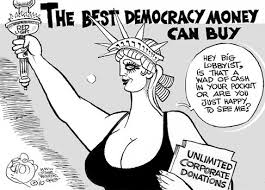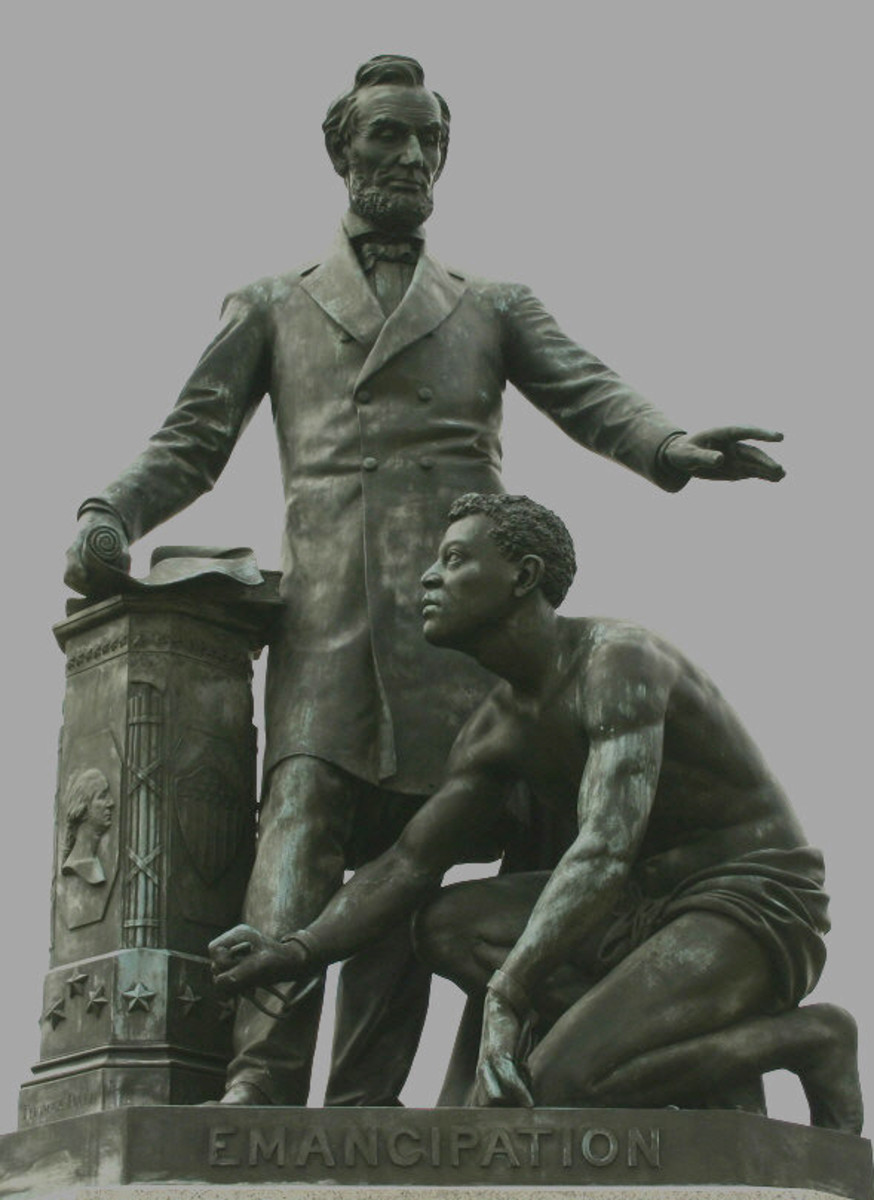Criticism of America: (A Conceptual Rebuttal)

Thank you, TheWorldNow, for this question: Why do so many Americans hate everything about America? And if they hate it so much why don't they just leave?
Though you asked this question two years ago, I see, I would still like to answer it, as it may echo the sentiments held by others today. That seems to be a question that never goes away, somehow.
Let me say at the outset that I am NOT going to make the 'freedom of speech' argument. I am NOT going to make the 'criticism of America is not hatred of America' argument. I am NOT going to say that 'we' who criticize America do so because we 'love our country and want it to be better,' and 'want America to live up to its promise,' and so forth.
No, I am not going to do any of that. I am going to offer, what I hope is, a slightly different spin on the matter.
First of all...
First of all, TheWorldNow, let us consider the question you asked again: Why do so many Americans hate everything about America? And if they hate it so much why don't they just leave?
You know, if we distill that question down to its essence, what we get, in essence, is: America---love it or leave it! Wouldn't you agree?
I mention this, because that admonition to 'love' America or 'leave' it strikes me as sounding very similar to something else.
Stay with me...
When one goes to a flea market or garage sale, or buys something from a thrift store, or buys something (a car or something) second-hand, he often runs into the warning that 'All Sales are Final;' with the understanding that you are buying the item 'As Is.'
What this means is that there is an understanding between the seller and you, the buyer, that you are purchasing something that is second-hand, not in pristine condition, has been used, worn, driven, or what-have-you, previously. The product has suffered some 'wear-and-tear' as a result of this previous use. There are, therefore, flaws in the thing. You are buying it with that understanding. The fact of defect will not be honored as a valid reason for trying to return it; in fact you will not be allowed to return it or exchange it, if you are not 'satisfied' with it---whatever 'it' may be.
Do you see where I'm going with this?
What I'm saying is that the injunction about America, 'love it or leave it' (which is the distillate of the question: Why do so many Americans hate everything about America? And if they hate it so much why don't they just leave?)-------is the precise notional equivalent of the thrift store, second-hand retail injunction which says that 'All Sales Are Final,' with 'No Returns Or Exchanges' allowed because the product is being sold in the 'As Is' condition.
This being the case, when we are advised about America to 'love it or leave it,' then, what we are being told is that we must accept the condition of the country we live in---and some of us, at least, love---in the 'As Is' state we find it in. 'No Returns' and 'All Sales Are Final!' This, of course, prohibits criticism because we are presented with a kind of 'pass/fail,' 'up/down,' 'all or nothing' proposition.
We are being asked to accept, on an 'all or nothing' basis, an America that is admittedly in a fallen state; one that has 'seen better days,' as it were; or which has lost a little of its old luster. Furthermore, we are asked to accept this without even the hope of a restoration of some kind---at least for the immediately foreseeable future anyway. Given that, we are asked, with the 'love it or leave it' injunction, to simply make the choice of 'should I go or should I stay,' to quote an old song.
To discuss our country's flaws, then, is to engage in a naïve attempt to execute 'returns' or 'exchanges' where none are permitted.
Now then, even someone making the 'love it or leave it' injunction, as far as America goes, and taking on board the implication I have drawn, would probably couple it with an invitation for us Americans to compare our lot---as Americans living in the United States of America---to that of people living in 'third world' or 'developing' countries.
Now then, if that is what you want to say, that is what you want to say. Fine and dandy! Though, that is not really the most positive way to live, is it? At least we're not those wretched ones over there!
Anyhoo....
Let me resume the direction I was going in originally before I so rudely interrupted myself.
What I want to say in regards to the question: (Why do so many Americans hate everything about America? And if they hate it so much why don't they just leave?) is this---the question is unfairly and invariably directed at labor and just as unfairly and invariably NOT directed at capital.
If you're paying attention you're probably asking yourself: What in the hell is he talking about now????!!!!
The first thing I should probably do is to define my terms.
Labor: When I refer to 'labor,' I'm talking about everyone who 'works for a living,' on the 'Nine-to-Five,' as it were. I'm talking about everybody whose primary income and accumulated wealth comes from her job (and perhaps, too, whatever equity is stored up in her house, if she has one). I'm talking about everybody whose work is classified as either unskilled, semi-skilled, or skilled. Side note: This is an example of how our economic system commodifies people. I, for one, think all people are 'skilled,' whether they have been formally trained in something or not.
To continue: When I speak of 'labor,' I am talking about everybody who filled out an application for the job he or she now holds, and would have noticed---if you looked at the fine print in the back---that their employment is 'At-Will,' meaning that the job maintains the right to dismiss you, at any time, without notice.
You, the employee, in theory, also, by this agreement, have the right to quit without notice, at any time. But, of course, in practice, you, the individual employee, will pay a price if you quit without giving two weeks notice, as you well know. That is what makes you LABOR! The company, however, in practice, will pay no price for suddenly firing you (and thousands of others at the same time, for that matter), without any notice. In fact, the stock market may very well reward the company with a spike in the share price. This is what makes the owners and management of the company CAPITAL!
I'm sure none is this is breaking news to anybody!
You are 'labor' if you are threaten-able. You all can just go ahead and stop all this tom foolery agitating and protesting and striking and talk of fair wages, decent working conditions, human treatment and the like. Cause if you don't, I'm going to pick up my factory and move it somewhere in the world where the people appreciate the value of work and the government knows how to properly encourage business... Yada, yada, yada.......
And so on and so forth. If you find something like that personally and collectively compelling, you are labor.
Capital: When I refer to 'capital,' I am talking about people we might think of as members of the capital-owning class. (Yes, Virginia, there is a such a thing as 'class' in the United States of America!)
When I talk of 'capital' or members of the capital-owning class, I am talking about people who are not threaten-able in any of the ways that 'labor' is vulnerable.
I'm talking about people whose wealth and income do NOT principally come from their direct employment. A small part actually comes from whatever it is they 'do for a living,' as it were. But the bulk of it comes from dividends from stocks and bonds and other things. We're talking about what we might call the 'corporate rich.'
We're talking about people on the boards of directors of large, increasingly multinational corporations, as well as top executives.
We're talking about all the major players, individually and organizationally, in the banking and financial services industry. This may also include all the major players, individually and organizationally, in the business media (top business journalists and executives).
We're talking about the people who own stuff: buildings, land, studios, holding companies, whatever.
--------------------------------------------------------------------------------------------------------
Now then, if you were to pose the question we've been discussing, in a slightly different form, like ('If you don't like America, why don't you just leave?) to a member of the capital-owning class, he (largely still a world of males) would probably just laugh, because of the sheer irrelevance of the question in application to himself.
But to start with---if we're honest with ourselves---we're afraid to pose such a question to 'capital,' aren't we? That is because 'he' is very likely to respond with something like: You're right. I am unhappy here, which is why I'm going to pick up my factory, with those thousands of jobs that go with it, and relocate to a part of the world that is better for my bottom line!
A place that he finds more favorable from a tax standpoint and from the demonstrated willingness of whatever country he considers, to allow him to externalize as much of his cost of production as possible onto the broader community (i.e., pollution, starvation wages, fourteen hour shifts, and so on).
That is precisely what has happened over the last few decades, as you know.
But, of course, this is old news. The form that globalization takes these days is really what is called the internationalization of production. What does that mean?
It means that capital tries to, essentially, make the whole world his factory.
Well, what does that mean? Let me give an example.
When the company, Otis Elevator, set about to create an advanced elevator system, it contracted out: a) the design of the motor drives to Japan; b) the door systems to France; c) the electronics to Germany; d) small geared components to Spain; e) and finally, systems integration was handled in the United States (1).
Here's the point: Multinational corporations like Otis Elevator are not bound by the need to accept the United States, or any other country for that matter, on a 'As Is' basis. We see, here, how a multinational can use many parts of the world simultaneously to maximize it business requirements. Such a 'take it or leave it' conception of political geography, as it pertains to the question this paper is examining, is increasingly irrelevant to 'capital.'
Another example
In 1993 the BMW corporation was looking around for a place to build a new auto plant. They spent three years thinking about 250 locations in TEN COUNTRIES. South Carolina in the United States, was on the list. The corporation's leadership were attracted by: the temperate climate; year-round golf; the availability of a several 'affordable' mansions; the cheap labor; low taxes; and limited union activity (2).
South Carolina won and when BMW indicated that they wanted a 1000 acre tract with a number of middle class homes and their families sitting on top of it, the state spent $36.6 million to buy the 140 properties; and leased it back to the automaker at $1 per year. South Carolina also paid the costs of recruiting, screening, and training workers for the new plant. South Carolina also raised another $2.8 million from "private sources" to send newly hired engineers to Germany for training (3).
Here's the point: Again, BMW was not bound to any conception of having to accept America or any other country on an 'As Is' basis. 'Capital,' in the form of this corporation, was able to use at least nine other countries in the world in order to optimize the cost-benefit to the organization in building a new plant. The localities and countries apparently vied with one another to offer BMW the best deal so that they would set up shop there and bring all those lovely jobs with them
'Capital' is able to use the world, or different parts of the world and its laws simulataneously to 'legally' evade taxes, thereby helping to maximize the financial health of both its business and personal assets (4).
'Capital's' ability to shape American politics has increased dramatically over the past forty years. I don't think there can be any question about that. Corporate-driven lobbying is a cottage industry in itself. There are campaign contributions---I mean CAMPAIGN CONTRIBUTIONS!
We all recall the Citizens United Supreme Court decision (5).
In 1970 only a handful of Fortune 500 companies had public affairs offices in Washington. By 1980 more than 80 percent did (6).
As the political influence of 'capital' has risen, that of 'labor' has decreased dramatically over the same period. In 1974 labor union funding accounted for half of all political action committee (PAC) money used to provide 'special interest' campaign support. By 1980 unions accounted for less than one-fourth of this funding (7).
During the late-1970s and early-1980s, at least one in every twenty workers who had voted for a union, were illegally fired. Some estimates put the number at one in eight. This eviceration of labor unions has no counterpart anywhere in the advanced industrial world (8).
----------------------------------------------------------------------------------------------
Conclusion
The question we have been examining briefly has been: Why do so many Americans hate everything about America? And if they hate it so much why don't they just leave?
Objections
1. My first objection to the very question is that it is fundamentally antithetical to democracy on its face. As I said, the question has the notional equivalent to the flea market, second-hand warning that the purchase is 'As Is. All Sales Are Final. No Returns. No Refunds. No Exchanges. No Store Credit. No Shoes. No Shirt. No Service!'
2. My second objection to the question is, as we've been discussing, the fact that it is not applied equally to both 'labor' and 'capital.' In fact, this question is never directed at capital for two reasons: A) We are afraid to pose such a question to 'capital' for fear that they will 'just leave,' taking their capital, factories, jobs, and tax revenue with them somewhere else more amenable; and B) As we have seen with a couple of examples, the question has increasingly little relevance to 'capital,' given the way political capitalism functions, rather seamlessly, across national boundaries.
3. 'Capital' does not, perhaps, 'complain' as much about the unfairness of it all as 'labor' does. Capital, as we have seen briefly, has amassed more and more power, over the past several decades, to make America and the world a better place for their businesses, finances, investments, and way of life. Labor, as we have seen, has lost power over the same period, to look after its way of life.
4. I'll close with this: the fourth objection. My fourth objection to the question we've been considering is where it usually comes from. That is to say, it is not 'capital,' by and large, that puts the question ('If you don't like America why don't you just leave?') to labor. No, it is typically 'labor' who poses this very question to---wait for it---labor. Do you follow me?
What I am saying is that the conflict which this question reflects and stirs up is one among segments of labor.
So then, if it is segments of labor who pose the (America: love it or leave it) question to other segments of labor, this means that the former (those segments of labor posing the question) identify themselves, in some way, with 'capital,' who are, of course, perfectly content with the 'state of America,' and all that because, for them, capital, that 'state' is never static for the reasons I have outlined. Do you follow me?
Look, let me simply skip a few steps to put it this way. In a 2002 book the political-economist, Kevin Phillips, wrote: "Class warfare, however is a false description, a perverse borrowing from Karl Marx. In the United States, the pro-wealth policies of the right have enjoyed substantial low and low-middle-income support, particularly among religious voters enlisted by cultural facets of conservatism" (9).
Curious, no? What Mr. Phillips is talking about here, of course, is the fact that some segments of 'labor' support capital, as exhibited by the former's support of 'pro-wealth' policies the 'right.'
Why is that though? Why should segments of the low and low-middle-income groups be, counter intuitively, inspired by the 'pro-wealth policies of the right'?
Former Rolling Stones journalist, Matt Taibbi, gives the perfect answer in his 2010 book, where we read: "In the ghetto, nobody gets real dreams. What they get are short-term rip-off versions of real dreams. You don't get real wealth with a home, credit, a yard, money for your kids' college---you get a fake symbol of wealth, a gold chain, a Fendi bag, a tricked-out car you bought with cash. Nobody gets to be really rich for long, but you do get to be pretend rich, for a few days, weeks, maybe even a few months. It makes you feel better to wear that gold, but when real criminals drive by on the overpass, they laugh" (10).
I want to end this, so let me just add this one sentence. When, then, do segments of 'labor' support the 'pro-wealth policies of the right,' as political-economist Kevin Phillips tells us? Journalist Matt Taibbi hit the nail on the head with the above quote. The answer simply has to do with the relationship, he identified, between 'real dreams' of wealth and the 'short-term rip-off versions of real dreams.'
Mr. Taibbi's book is about the financial crisis that hit America in 2008. His thesis is that the obviously criminally fraudulent behavior of the financial institutions, from his perspective, is symptomatic of increasing upwards concentrations of wealth and power that has been happening for decades.
There is an idea I developed in a review of Taibbi's book and elsewhere. This idea of 'real dreams' and 'short-term rip-off versions of real dreams' can be thought of this way. Lord of the Rings. Gandalf the Wizard and most of the heroes accompanying the Hobbit, had bought into the idea that the ring of Sauron had to be destroyed. However there was a minority who thought that the Dark Lord's very ring, that thing of evil, could, nevertheless, be used against him and that, therefore, it should not be destroyed but kept and used.
If you want to read more about this, here's the book review: http://wingedcentaur.hubpages.com/hub/Griftopia-Bubble-Machines-Vampire-Squids-and-the-Long-Con-The-Is-Breaking-America
That is quite enough, I think. Thank you so much for reading!
-----------------------------------------------------------------------------------------------------
Notes
1. Korten, David C. When Corporations Rule the World. Kumarian Press, Inc. and Berret-Koehler Publications, Inc., 1995. p.125
2. ibid, p.130
3. ibid
4. For a comprehensive discussion of this, you might consider: Johnston, David Cay. Perfectly Legal: The Covert Campaign To Rig Our Tax System To Benefit The Super Rich----And Cheat Everybody Else. Portfolio, 2003.
5. Retrieved 05/28/2014 http://en.wikipedia.org/wiki/Citizens_United_v._Federal_Election_Commission
6. Korten, David C. When Corporations Rule the World. p.143
7. ibid
8. Krugman, Paul. The Conscience of a Liberal. W.W. Norton, 2007. p.150
9. Phillips, Kevin. Wealth and Democracy: A Political History of the American Rich. Broadway Books, 2002. p.xiii
10. Taibbi, Matt. Griftopia: Bubble Machines, Vampire Squids, and the Long Con That Is Breaking America. Spiegel and Grau, 2010. p.11








